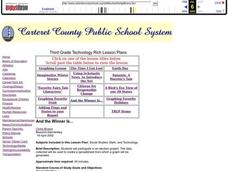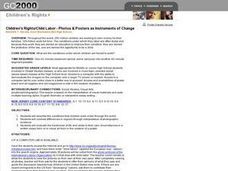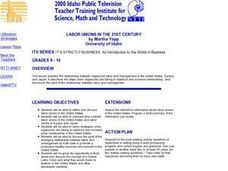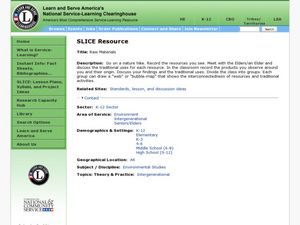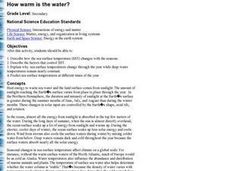Curated OER
Lesson 1
Students understand the meaning of natural resources. They distinguish between renewable and non-renewable natural resources. To help students identify natural resources as either non-renewable or renewable. To stimulate student thinking...
Curated OER
And the Winner Is...
Third graders participate in an election project. They collect data to create a spreadsheet from which a graph is generated.
Curated OER
Our World A Complex Eco-system
Sixth graders set up an ecosystem, investigate conservation techniques, develop an action plan for conservation, and various other activities to explore the ecosystem.
Curated OER
Melodic Rhythms of India
Middle schoolers listen to and dance to the music of India. After listening to the music again, they identify the different types of instruments playing the melody. They explain the tabla tarang and view photographs of people performing...
Curated OER
Ooooh, The Oud
Students listen to a performance of the instrument, oud. After watching a video, they discover how many parts of the world it is used in and locate the countries on a map. They compare and contrast the oud with other instruments from the...
Curated OER
Children's Rights/Child Labor - Photos & Posters as Instruments of Change
Students research the use of students for labor around the globe. Using magazine pictures, they create a poster showing the various conditions they are subject to. They compare and contrast the differences in regions and evaluate the...
Curated OER
Tropical Regions/Mapping Biodiversity
Students use a world map to locate the country of Puerto Rico. In groups, they identify the various types of vegetation found on the island. They compare and contrast the biodiversity of the country to the United States. To end the...
Curated OER
Energy Efficiency Ambassadors
Students research and compare two products that provide the same function but require different amounts of energy to do the job. They examine and demonstrate energy efficiency and discover how it applies to different technologies and...
Curated OER
WorldWatcher Activity: Using Data to Investigate Issues and Solutions
Young scholars use the WorldWatcher program to identify the issues affecting their country they have been using for these activities. In groups, they identify each issue and identify the solution or develop their own. They present their...
Curated OER
Acid Rain Keeps Falling On My Head
Students measure the pH of local rain water. Students map the location of the collected rain water according to pH levels.
Curated OER
How Much Is There To Eat?
Tenth graders compare the relationship of food production and population in India with the southern regions of the United States.
Curated OER
BOUNCING INFORMATION AROUND
Students examine how satellite signals are sent and duplicate it with a mirror, flashlight and black paper.
Curated OER
Air Pollution: What Can You Do?
Students discuss and write about air pollution in their journals. They practice using new vocabulary words associated with pollution and write sentences using those words. They end the lesson by determining what they can do to fight air...
Curated OER
LABOR UNIONS IN THE 21ST CENTURY
Students define and discuss labor unions in the United States. They compare and contrast labor unions in the United States and labor unions in Europe and Japan.
Curated OER
Raw Materials
Young scholars participate in a nature hike and record the natural resources observed. They compare traditional and modern versions of everyday use items, and create graphic organizers that demonstrate the interconnectedness of resources.
Curated OER
How Warm is the Water?
Students research how surface sea temperature changes throughout the year. They draw a time series of sea surface temperatures for each month of the year and a depth profile for a summer and winter month using an OceanExplorer Profiler...
Curated OER
Mud Fossils
Students create their own fossils in an activity using plaster of paris and a variety of objects which can be fossils, e.g. chicken bones, twigs, shells, etc. After making their fossils, they allow them to dry and discuss time and its...
Curated OER
FILLING IN THE GAPS - Acquiring and Analyzing Satellite and Ground-Based Data
Students monitor rainfall, compute daily averages, and compare their methods of computation to those used by actual researchers using satellite observations.
Curated OER
Where Have All the Glaciers Gone?
Learners examine how climate change is affecting sea ice, vegetation and glaciers in the Arctic region.
Curated OER
Focused Learning Lesson: World Geography
Students examine the impact that humans have had on the environment and the difficulties the environment can cause. They also examine major physical changes as a result of human action or natural causes.
Curated OER
Sunspot Graphing
Students, using 15 years of sunspot data, plot data on a classroom graph. They discuss why the pattern from their individual sheets did not and could not match the class graph.
Curated OER
Fair Trade: Chocolate Can Be Good For You
Students discover the process of chocolate production. They read stories from boys in Ghana and Brazil who work on cocoa plantations. They illustrate the principles of fair trade.
Curated OER
The Arctic and Taiga Ecozone of Canada
Students discover the differences in the Arctic and Taiga regions of Canada. They identify physical and human characteristics of both region. They also practice using an atlas.
Other popular searches
- Globalization and Health
- Cultural Globalization
- Economic Globalization
- Globalization and Nafta
- Globalization of China
- Effects of Globalization
- Globalization and Culture
- Globalization Culture
- Technology and Globalization
- Globalization Culture Video
- Globalization and China
- Esl Lessons Globalization



